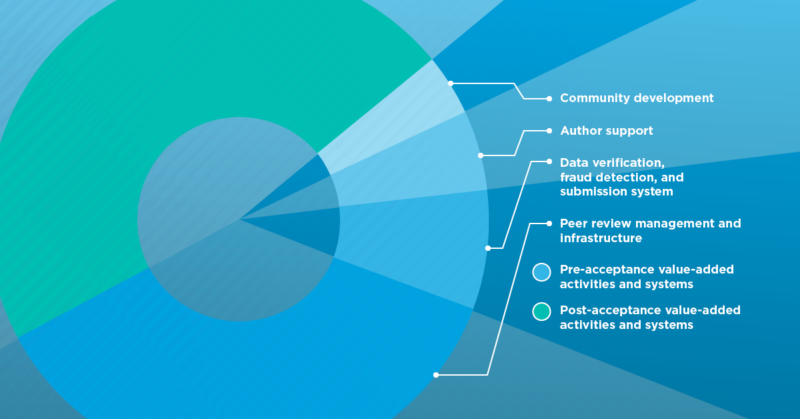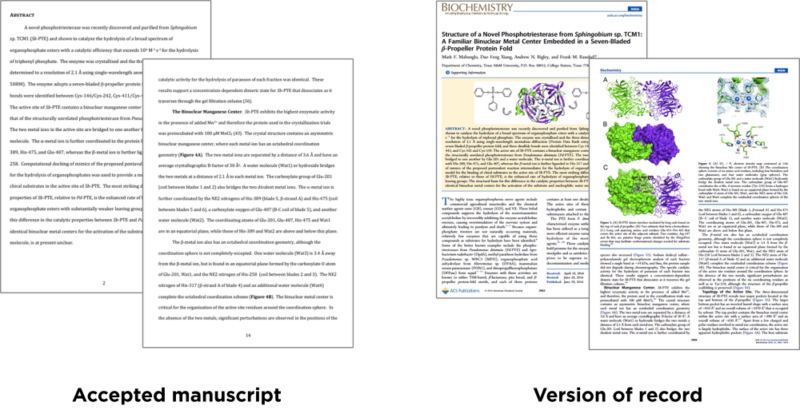Zero-Embargo Green Open Access
A reduced-cost alternative to full OA that supports immediate sharing of accepted manuscripts
Quick facts about ACS Publications’ zero-embargo green open access option and ADC
- Many governments, most recently the US, are adopting mandates that require authors to make accepted manuscripts immediately available when the research was supported by public funding. This is often referred to as to as “zero-embargo green open access”.
- Rapid changes in funding and related requirements are causing fear and frustration among authors, libraries, and beyond. Many researchers are now, or will shortly be, expected to make their accepted manuscripts immediately available in open access repositories when the final article is published.
- ACS permits authors to make their accepted manuscript immediately open for public consumption after either an open access Article Publishing Charge (APC) or an Article Development Charge (ADC) is paid.
- The ADC is due only after acceptance. It is not a submission or deposit fee. It affords broad sharing capabilities for the accepted manuscript by any means and is directly proportional to the cost of publishing services provided up to acceptance.
- The ADC represents a lower-cost alternative to a full APC, and the majority of publishers require a full APC prior to sharing the accepted manuscript.
- Authors publishing under an ACS institutional open access agreement will never need to pay the ADC.
- The ADC may be an allowable publication cost under the terms of many federal and international research grants, meaning authors may be able pay it using grant funding. Authors should confirm with their funder before choosing this option.

What is zero-embargo green OA?
A number of funders and institutions require authors to retain the right to post their accepted manuscripts to a repository immediately upon acceptance for publication in a journal, sometimes referred to as zero-embargo green open access (OA). The majority of ACS authors subject to these mandates already have a simple and funded pathway to publish gold OA in ACS journals, typically through an institutional open access agreement.
This new zero-embargo green OA option provides a reduced-cost option that allows authors without access to an institutional OA agreement to post their accepted manuscripts in open access repositories immediately upon acceptance.
This option expands affected authors’ choices beyond their previous options:
- Wait 12 months to post accepted manuscripts in a repository at no cost, which was previously the only available green OA option when publishing in ACS journals: a route which may not be compliant with their institution or research funder’s self-archiving policy;
- Publish the final article as immediate open access in a journal by paying an article publishing charge (APC), which also allows authors to immediately post their accepted manuscript to a repository: this is the only compliant zero-embargo open access route that the majority of publishers offer.

Making Zero-embargo Green OA Sustainable
The chart to the right shows the relative portion of publishing services delivered through final editorial decision. This represents more than half of our publication costs. It includes organizing, developing, and maintaining the high-quality scholarly peer review process and multiple other publishing services provided by a vast global network of editors and reviewers. It also encompasses the development and maintenance of the technology and systems necessary to provide secure manuscript submissions and manage peer review among a vast global network of editors and reviewers. The ADC is directly proportional to and covers these pre-publication costs.
The article development charge (ADC) is due after acceptance and before publication. It is also only applicable to authors who choose the zero-embargo green OA option.
Gold vs. zero-embargo green OA
Gold OA involves making the final published article (‘version of record’) immediately available online, with no charges for readers, upon payment of an article publishing charge (APC). Zero-embargo green OA involves posting the accepted manuscript in an OA institutional or subject repository immediate upon acceptance for publication in a journal.
This option builds on the current free option for authors to post after a 12-month embargo period. Unlike an article publishing charge, the ADC does not cover expenses related to final production, digital distribution, discovery, and hosting of the version of record or maintaining post-publication updates.
The version of record remains the ‘gold standard’ as it reflects the final definitive and discoverable article. The zero-embargo green OA option is an alternative for those authors who need immediate OA and are not covered by an institutional open access agreement and do not have access to other methods of funding gold OA publication.
Check out a visual comparison of the different pathways to achieve open access.

How authors select zero-embargo green OA
Authors who note in their cover letter or manuscript that they want to immediately post the accepted manuscript will trigger the process. Authors pay the ADC after acceptance but before publication.
To continue enhancing opportunities for researchers and students from under-resourced regions, ADC waivers or discounts will be automatically applied when the corresponding author originates from a country that currently receives special country pricing for article publishing charges.
If authors later decide they would like to deposit the version of record, they may opt for gold OA and the ADC will be credited toward the article publishing charge.
An option that sits in between the previous “all or nothing” OA pathways
This option represents an expanded “middle ground” for authors not covered by an institutional open access agreement. The table below shows the development ACS undertakes on the behalf of authors between submission and publication for the version of the article that may be posted to an open access repository.
Compare the author benefits of each open access pathway
| Feature | Gold via Institutional OA Agreement | Gold via APC | Zero-Embargo Green | 12-month Embargo Green | ChemRxiv |
|---|---|---|---|---|---|
| Publicly available immediately | |||||
| Manuscript submission | |||||
| Initial vetting | |||||
| Data verification | |||||
| Fraud detection | |||||
| Multi-expert peer review | |||||
| Rapid, thorough feedback | |||||
| Manuscript acceptance or rejection | |||||
| Tech editing | Subscription view only | Subscription view only | |||
| Layout / design | |||||
| Metadata tagging | |||||
| Ensure discoverability | |||||
| Promotion | |||||
| Maintenance of definitive version of record | |||||
| Long-term preservation |

Differences between the accepted manuscript and version of record
The accepted manuscript (shown left) includes all changes made to the submitted manuscript through the editorial development process, including incorporation of peer review feedback and basic formatting in line with the journal’s submission requirements.
The enhancements provided to the version of record (shown right) include: professional formatting; image support; technical edits; metadata tagging for discovery; digital linking, maintenance over time for retractions or corrections; multi-format distribution; enhanced discovery; provision of usage and citation statistics; indexing with CAS, internet search engines, and more; long-term preservation with Portico; maintenance of reference links; hosting of supporting materials; and many more services and enhancements. Together, these enhancements make the version of record easier to read, provide discoverability for the widest possible audience, and ensure it remains part of the scholarly record for future researchers to build upon.
Frequently asked questions
The article development charge (ADC) covers the cost of ACS’ publishing services through final editorial decision, which includes organizing and maintaining a high-quality scholarly peer review process. This charge also supports the development and maintenance of the technology and systems necessary to provide secure manuscript submissions and manage peer review among a vast global network of editors and reviewers. This rigorous process ensures that all authors who publish with ACS Publications can remain confident their manuscripts are secure and have been accepted by the most trusted and prestigious journals in the field of chemistry, regardless of the pathway they choose to publication.
The ADC is $2,500. More information can be found on our pricing page.
The ADC is only an option when publishing in ACS hybrid journals. The version of record for all articles published in our fully open access journals are made immediately open access upon publication.
No. The ADC will only apply to articles in which authors have included their research funder’s standard language regarding immediate self-archiving of the accepted manuscript, and where the submitting corresponding author does not indicate that they wish to publish the version of record as open access (e.g. under an institutional open access agreement).
The ADC covers the costs associated with the services provided from submission to final editorial decision. These costs are significant, comprising about 50% of the overall cost of publishing the final version of record.
Unlike an article publishing charge (APC), the ADC does not cover expenses related to final production, digital distribution, discovery, and hosting of the version of record or maintaining post-publication updates. The features that make articles discoverable are also added during the final phase of article publication.
For those authors who later decide to make the version of record fully open access, the article publishing charge (APC) will be offset by the amount as the article development charge.
Funders who require researchers to immediately post the accepted manuscript upon acceptance usually recommend that standard language is included either in the manuscript or cover letter. If this documentation is included with the manuscript when it is submitted to an ACS journal, it will automatically trigger the zero-embargo green OA process. Our OA Operations team will contact the submitting corresponding author to confirm next steps.
The article development charge is due for payment after the manuscript is accepted but before publication. Early payments are also accepted.
Accepted manuscripts published under the zero-embargo green open access option will be issued with a DOI. The DOI is registered upon acceptance and will become active when the final version of record is published in an ACS journal. The DOI will resolve to the version of record.
No. If we identify that a submitting corresponding author is affiliated with an institution that has an active open access agreement with ACS, or if they indicate to our OA Operations team that they have funding available to make the version of record open access, the ADC will not be applied.
If an author has already paid the ADC and then decides to publish their final article as immediate open access, the article publishing charge (APC) will be offset by the amount as the article development charge.
For example, if the list APC for the chosen journal is $4,500 and the article development charge of $2,500 has already been paid, then the article publishing charge will be reduced to $2,000.
ADC waivers or discounts will be automatically applied to papers from corresponding authors from all countries that currently receive special country pricing for APCs.
The White House Office of Science and Technology Policy (OSTP) issued policy guidance in August 2022 about establishing free public access to all federally funded research. This guidance requires all United States federal funding agencies to publish updated public access policies no later than the end of 2024. All new projects funded by an agency must comply with the relevant policy within 12 months of that policy being finalized.
Some other research funders outside the U.S. also have public access policies. New policies are announced frequently and will apply to most or all new grants issued by that funder.
An author’s research funder will always be the most reliable source of information about their policies.
Applicable policies will be available on a funder’s website, and/or may be specified in the terms of a grant. Authors who are unsure of whether their funder has these requirements should contact their funder directly.
No. Unless their research funder or institution has specified that research outputs must be publicly accessible without any embargo period following acceptance for publication in a journal, then funded / affiliated authors do not need to pay an article development charge.